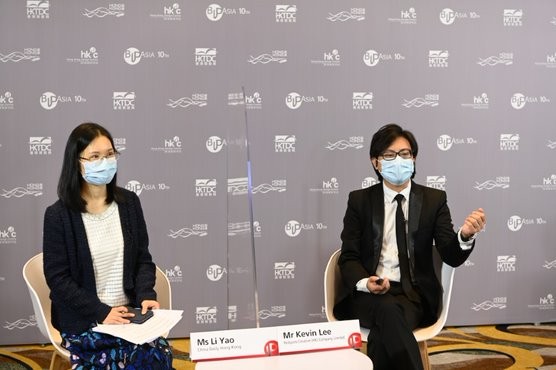2020-12-05
Luo Weiteng and Edith Lu

As virtual interactions and events turn into key communication channels among pandemic-wary consumers during the global coronavirus crisis, interest in digital ambassadors has surged to offer versatility for brands, which spells potentially huge opportunities for those jumping on the bandwagon. Industry leaders and experts spoke on Friday at a panel discussion, titled “IP Strategies in the Age of Digital Ambassador”, co-organized by China Daily as part of the two-day Business of IP Asia Forum in Hong Kong. The 10th edition of the BIP forum was opened by Chief Executive Carrie Lam Cheng Yuet-ngor on Thursday, who stressed the “pivotal role” of a robust IP regime in innovation and creativity, and the myriad opportunities on offer in the Guangdong-Hong Kong-Macao Greater Bay Area. Catherine Liu, research director of Beijing EntGroup Century Data Technology, gave a brief interpretation of the marketing strategies of the digital ambassador industry at the panel discussion. Digital ambassadors began to draw attention four years ago when some brands started paying heed to the industry’s rise and thinking about potential business collaboration, she recalled. “The questions we were contemplating at that time were how to evaluate the digital ambassadors, and whether we should treat them the same way we do with human celebrities. The answer is: We need to gauge digital ambassadors mainly by their commercial value,” said Liu. There are now various cases of integration of brands and digital ambassadors in the market. Generally speaking, digital ambassadors fall into three categories — virtual stars, virtual anchors and virtual idols deriving from certain intellectual property, she said. Unprecedented attention Virtual idols mainly interact with their fans through online performances and concerts. China’s most famous virtual singer Luo Tianyi now has 4.73 million fans on Weibo and tickets to her concerts cost up to 1,580 yuan ($242) each. Her popularity helps her appear more and more on TV and has lured many companies to launch co-brand products. Virtual anchors are usually active on livestreaming platforms, attracting audiences and bringing sales to brands and platforms. Virtual idols that derive from IP are the focus of the digital ambassador business. “IP” specifically refers to popular online products like novels, games, comics or a song that can be adapted into other media, including film or TV series. Most virtual idols from IP have a larger base of fans, compared with other digital ambassadors. “This year, people pay more attention to digital ambassadors than ever before. But the industry remains at a quite initial stage, with much untapped commercial value. Our practice has revolved around the commercial value and properties of virtual idols. We also recognized some risks and problems during our exploration,” Liu said. Kevin Lee Ka-tsun, founder and CEO of multimedia production company Redspots Creative (Hong Kong), said the sheer power of digital ambassadors is not limited to comics, animation and gaming. In April, the World Health Organization enlisted virtual influencer Knox Frost to deal with a real challenge: to get accurate and vetted information about COVID-19 to digital-savvy millennials and Generation Z — those born between 1996 and 2010. Another case involves one of the most famous virtual influencers on Instagram, Lil Miquela, whose sweeping popularity makes the forever-19-year-old with 2.9 million followers collaborate with an array of big brands to reshape the future of fashion advertising. The virtual influencer can be a novelty technology. But no matter what the technology, be it augmented reality, virtual reality, or 3D, we need to go back to content in the end; and content is led by IP, Lee stressed. Cross-border opportunities Companies holding popular IPs aim to tap into more and larger markets. Sze Yan-ngai, founder and chairman of online game distributor and developer Gameone, said his company has been in talks with Chinese mainland comic platforms and animation producers to bring more Hong Kong IPs to mainland audiences. With generations of readers already hooked on Hong Kong martial arts novels and their TV and silver screen adaptations, Sze said, mainland industry players believe Hong Kong’s martial arts IPs are cliche; but it’s just due to bad operations in the past. He expects the younger generation on the mainland will be attracted to these martial arts IPs, although they’ve to deal with some problems regarding painting style and reading habits. Although COVID-19 has prevented us from going to the mainland, it’ll not stop us from seeking opportunities there, said Sze. “There’re companies approaching us for IP collaboration, and I’m confident that the industry’s recovery will be speedy.” Yang Xiaoxuan, vice-president of mainland livestreaming giant iQiyi, said the ever-evolving technology and innovation pose a real challenge: How can content creators offer innovative content under the premise of technological innovation? For content creators, familiarity with both technology and operation is a must-have. It requires us to incubate products in the shortest time and change some outdated patterns of incubation, she said. “This should be the long-term goal in our journey to catch up with international counterparts in developing world-class virtual idols,” she said. IQiyi started developing its own virtual idol in 2018 and has bankrolled big efforts in this field. Its Rich Boom made a global debut on MTV Video Music Awards Japan last month and claims to be China’s first virtual idol group featuring trendy culture and pop music. sophia@chinadailyhk.com